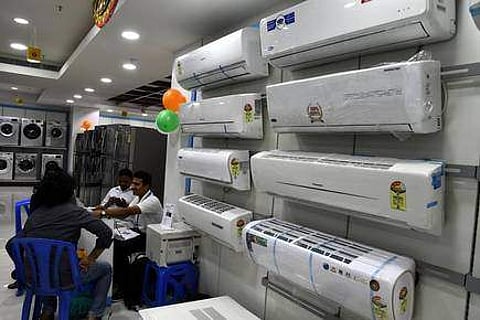

COVID-19 pandemic has changed everything about us, but one of its essential impacts is just around the corner. And that's the use of airconditioning, especially in the hot, sweaty and sticky Indian summers. Air Conditioning has been the answer to instant cooling for the torrid heat. The time the summer months hit us during a barrage of COVID-19 cases, through a global pandemic. While many of us are ready to brave the heat, if it means surviving the killer epidemic, it's not an either/or situation that you'd need to face.
Is it safe to use an AC?
With the summers already in, we're wondering if it's safe to switch on an AC or even step into centralised air conditioning? What if a COVID-19 positive person has been breathing in the same air as me? Would I be positive now?
In this article, we are here to answer all your questions while we tackle common air conditioning myths with facts:
1. Myth: ACs induce viral flu-like symptoms
Fact: The flu or influenza strain occurs due to a virus and not the temperature of your body or ambient surroundings. So, the use of air conditioning would not bring you to sickness on its own. If you sanitise your environment and regulate your indoor humidity, you will remain healthy.
2. Myth: Use of Air Conditioners can spread the virus
Fact: The Indian Press Information Bureau (PIB) has confirmed, based on government releases, the use of ACs during this time. The issue, is in fact, mainly with central air conditioning systems.
What's the Issue with Central Air Conditioning?
These central air conditioning systems use commercial air filters to circulate cold air. By design, these industrial filters can remove coarse practices.
Now, imagine that these filters are like regular cloth face masks. While they would protect us from larger particles, they would nor remove finer particulate matter. An N-95 mask, in such a case, filters out at least 95% airborne particles.
To protect ourselves from the coronavirus, we would need better air filters, like these N-95 masks. For hospitals or ICUs, which require superior air quality, these N-95 masks are HEPA filters. These HEPA filters also prevent the spread of airborne bacterial and viral organisms.
Medical-grade air conditioning systems which employ such filters, also have high-energy ultra-violet light panels with an anti-microbial coating to kill live bacteria and viruses trapped by the filter. These HEPA units are 99.995% efficient so that they will protect from any such infections.
Coming back to the question, the quality of the central air conditioning would determine whether you'd be safe from the virus or not. This, in turn, may cause most buildings to switch to HEPA filters and medical-grade ACs.
3. Myth: Keep rooms closed while using ACs
Fact: Avoid locking or closing rooms, without any scope of ventilation, when you switch on your air conditioner. The Indian Society of Heating Refrigerating and Air ConEngineers (ISHRAE)'s guidelines for AC temperature (shared by the Central Public Works Department (CPWD)), talks about ventilation and air temperature. The cooled air gets recirculated by room air conditioners and can become stale in terms of breathability after some time, with a build-up of exhaust fumes. Keeping a window slightly open will allow the exhaust fumes a way out and bring in the fresh air too.
4. Myth: Colder temperatures will kill the virus
Fact: Air conditioners set at low-temperature settings will not keep you safe from the virus or cause it to become non-functional. They do, however, weaken your immunity by fluctuations in body temperature (as average temperatures are higher).
Instead, we'd advise you to maintain temperature settings between 24 degrees to 30 degrees, so that you're pleasantly cool, but don't face an indoor chill. Exercise caution and defeat these four myths by following appropriate measures when you switch on the AC. This way, you can have your cold and keep it too.
The author of this article is a research analyst and Indoor Air Quality expert and founder of Amfah India
